ОСОБЛИВОСТІ НАВЧАННЯ ЧИТАННЯ ІНОЗЕМНОЮ МОВОЮ: ЗАДІЯНІ ПСИХОЛОГІЧНІ МЕХАНІЗМИ ТА ОПАНУВАННЯ СТРАТЕГІЯМИ ЧИТАННЯ
DOI:
https://doi.org/10.33099/2617-6858-2022-70-6-149-156Ключові слова:
читання;, робоча пам'ять;, іноземна мова;, стратегії читання;, система мови.Анотація
Дослідження розглядає розвиток когнітивної навички читання іноземною мовою як складного процесу, який передбачає залучення механізмів робочої пам’яті. Встановлено які саме механізми робочої пам’яті і у який спосіб впливають на процес читання іноземною мовою. Окреслено зміст та принципи навчання та застосування стратегій читання. Визначено вплив на виконання завдань на розуміння прочитаного тексту в умовах використання стратегій читання.
Завантаження
Посилання
Abbott, M. (2010). An Introspective Study of Arabic and Mandarin-Speakers’ Reading Comprehension Strategies. TESL Canada Journal, 28(1), 14. https://doi.org/10.18806/tesl.v28i1.1058
Alderson, J.C. (2000) Assessing Reading. Cambridge University Press, Cambridge. https://doi.org/10.1017/CBO9780511732935
Anderson, R. & Pearson, P. (1984). A schema-theoretic view of basic processes in reading comprehension.
Anderson, N. (2003). Scrolling, clicking, and reading English: Online reading strategies in a second/foreign language. The Reading Matrix. 3.
Baddeley, A. (1986). Working memory. New York: Oxford University Press.
Baddeley, A.D., & Hitch, G. (1974). Working memory. In G. A. Bower (Ed.), The psychology of learning and motivation: Advances in research and theory (pp 47-89). Academic Press.
Brunfaut, T., Kormos, J., Michel, M.C., & Ratajczak, M. (2021). Testing young foreign language learners’ reading comprehension: Exploring the effects of working memory, grade level, and reading task. Language Testing, 38, 356 - 377. https://doi.org/10.1177/0265532221991480
Carrell, P. L. (1998). Can Reading Strategies Be Successfully Taught? Australian Review of Applied Linguistics, 21, 1-20. https://doi.org/10.1075/aral.21.1.01car
Cummins, J. (1979). Linguistic Interdependence and the Educational Development of Bilingual Children. Review of Educational Research, 49(2), 222–251. https://doi.org/10.2307/1169960
El-Koumy, A.S. (2004). Teaching and Learning English as a Foreign Language: A Comprehensive Approach. Educational Resources Information Center, USA.
Enright, M.K., Grabe, W., Koda, K., Mosenthal, P., Mulcahy-Ernt, P. and Schedl, M. (2000) TOEFL 2000 Reading Framework: A Working Paper. TOEFL Monograph Series, Educational Testing Service, Princeton, i-157.
Goodman, K. S. (1967). Reading: A psycholinguistic guessing game. Journal of the Reading Specialist, 6(4), 126–135. https://doi.org/10.1080/19388076709556976
Grabe, W. (1991). Current Developments in Second Language Reading Research. TESOL Quarterly, 25(3), 375–406. https://doi.org/10.2307/3586977
Hudson, T. (2007). Teaching Second Language Reading. Oxford: Oxford University Press.
Jeon, E., & Yamashita, J. (2014). L2 Reading Comprehension and Its Correlates: A Meta‐Analysis. Language Learning, 64, 160-212.
Kern, R. G. (1994). THE ROLE OF MENTAL TRANSLATION IN SECOND LANGUAGE READING. Studies in Second Language Acquisition, 16(4), 441–461. http://www.jstor.org/stable/44487781
Linck, J.A., Osthus, P., Koeth, J.T., Bunting, M.F. (2014). Working memory and second language comprehension and production: A meta-analysis. Psychonomic Bulletin and Review, 21(4), 861-883. https://doi.org/10.3758/s13423-013-0565-2
Masrupi, Jhon Fahamzah, Nurhaeda Gailea, Ahmad Baihaki, Mustofa Usman. (2020). Reading Comprehension Strategies Effectiveness in Completing Test of English as a Foreign Language. Journal of Southwest Jiaotong University. https://doi.org/10.35741/issn.0258-2724.55.6.36
Nagy, W. (2007). Metalinguistic awareness and the vocabulary-comprehension connection. In R. K. Wagner, A. E. Muse, & K. R. Tannenbaum (Eds.), Vocabulary acquisition: Implications for reading comprehension (pp. 52–77). Guilford Press.
Nuttall, C., & Alderson C. (1996). Teaching Reading Skills in a Foreign Language. 2nd Ed. Oxford: Macmillan Heinemann English Language Teaching.
Oakhill, J. V., & Cain, K. (2012). The precursors of reading ability in young readers: Evidence from a four-year longitudinal study. Scientific Studies of Reading, 16(2), 91–121. https://doi.org/10.1080/10888438.2010.529219
Pae, T.‐I. (2019). A simultaneous analysis of relations between L1 and L2 skills in reading and writing. Reading Research Quarterly, 54(1), 109–124. https://doi.org/10.1002/rrq.216
Pearson, P. D., & Gallagher, M. C. (1983). The instruction of reading comprehension. Contemporary Educational Psychology, 8(3), 317–344. https://doi.org/10.1016/0361-476X(83)90019-X
Perfetti, C. (2007). Reading ability: Lexical quality to comprehension. Scientific Studies of Reading, 11(4), 357–383. https://doi.org/10.1080/10888430701530730
Peng, P., Barnes, M., Wang, C., Wang, W., Li, S., Swanson, H. L., Dardick, W., & Tao, S. (2018). A meta-analysis on the relation between reading and working memory. Psychological Bulletin, 144(1), 48–76. https://doi.org/10.1037/bul0000124
Repovš, G., & Baddeley, A. (2006). The multi-component model of working memory: Explorations in experimental cognitive psychology. Neuroscience,139(1): 5-22. https://doi.org/10.1016/j.neuroscience.2005.12.061
Smith, F. (1973). Psycholinguistics and reading. Holt, Rinehart & Winston.
Upton, T. A., & Lee-Thompson, L.-C. (2001). THE ROLE OF THE FIRST LANGUAGE IN SECOND LANGUAGE READING. Studies in Second Language Acquisition, 23(4), 469–495. http://www.jstor.org/stable/44486958
Uribe-Enciso, O. (2015) Improving EFL students’ performance in reading comprehension through explicit instruction in strategies. Rastros Rostros, 17(31), 37-52. http:// dx.doi.org/10.16925/ra.v17i31.1271
Van den Broek, P., Mouw, J., & Kraal, A. (2016). Individual differences in reading comprehension. In P. Afflerbach (Ed.), Handbook of individual differences in reading: Text and context (1 ed., pp. 138-150). Routledge.





